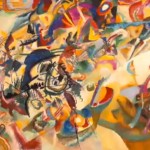Several years ago, in a seminar on modern and postmodern lit, I wrote a fun paper on Ezra Pound’s music criticism. In particular, I was interested in Pound’s admiration for Bartok’s String Quartet #5, which he described as:
a work in [Bartok’s] own idiom, consistently in his own idiom, built up into a complete and coherent structure. It is like no other known quartet. It definitely adds to the literature or whatever we are to call articulate repertory of work written for four stringed instruments. It projects from the preceding borders and frontiers of quartet composition, and is highly satisfactory in so doing.
Any study of Pound and music is inherently fraught with problems. Though he was able to play the clavichord, Pound never received formal training in music theory and lacked experience as a performer. As a composer, Pound has only one major work to his name, Le Testament de Villon, an opera first performed in 1926. By his own admission, Pound was also quite tone deaf, a fact not lost on his friends. Upon hearing of Pound’s work on Le Testament, William Carlos Williams joked, “Pound writing an opera? Why, he doesn’t know one note from another.”
In his published criticism, Pound often responds to the music viscerally — the way it makes him “feel” — rather than formally. Except for the occasional “pizzicati” or “counterpoint,” his reviews are often devoid of technical terminology. He seems conscious of his own weaknesses and protects himself by couching his attacks in comments like, “at least I felt” and “seemed to me.” That his opinions often mirrored those of his musical advisors of the moment — George Antheil and Tibor Serly, in particular — has also not gone unnoticed by his critics.
As I’ve never cared too much for most of The Cantos, my paper turned into a formal analysis of Bartok’s quartet, which really is a remarkable piece. The second movement, the Adagio Molto, is beautifully dissonant— one of those remarkable collisions of modernist invention and melody. People who “don’t like” post-Romantic music have surely never heard the Fifth.
